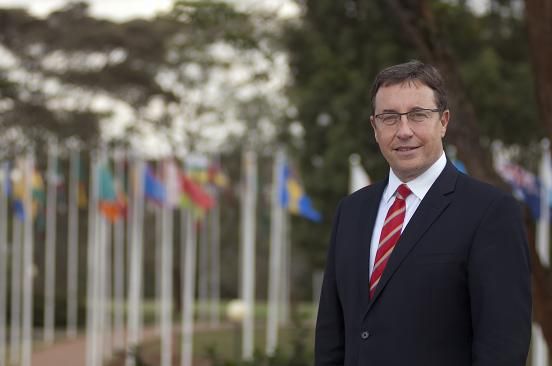COP20 and beyond
With a little over a year to go before COP 21 in Paris, the twentieth conference of the Parties to the United Nations Framework Convention on Climate Change in Lima is a critical opportunity to ensure that we are on track to achieve a legally binding and universal agreement on climate change by the 2015 deadline.

The United Nations Climate Summit in New York in September this year, helped to raise political momentum for a meaningful, universal climate agreement by mobilising new coalitions, money and markets, by strengthening resilience, and by advancing climate action on carbon pricing. More than 800 leaders from business, finance and civil society joined world leaders in what was an unprecedented show of support for climate change action.
What is remarkable about the chorus of voices calling for a universal agreement on climate change is that they are now widely representative of our entire society, with the Climate Summit welcoming commitments made by the financial sector on a scale never before witnessed.
For example, a new coalition of governments, business, finance, multilateral development banks and civil society leaders announced their intent to mobilise over US$200 billion for financing low-carbon and climate-resilient development. While at the national level, countries strongly reaffirmed their support for mobilising public and private finance to meet the US$100 billion dollar goal per annum by 2020, with developing countries promised mitigation commitments of US$3 billion from the European Union, and the Green Climate Fund receiving a multi-billion dollar injection of capital from half a dozen countries worth US$2.3 billion.
Lima presents our best opportunity to create the first draft of a meaningful and universal climate agreement
However, as the recently published Emissions Gap Report makes clear, to stay within the 2°C limit, total global greenhouse gas emissions must peak and start declining within the next few years. To ensure that this happens we must do more - and quickly - to transition from a carbon intensive, to an inclusive green, economy. We cannot make this shift without the support of the private sector and an enabling policy environment.
Lima (pictured below) presents our best opportunity to create the first draft of a meaningful and universal climate agreement which balances support for adaptation and mitigation, and enables governments to outline what strategies and policies they will adopt to maintain consistency with a less than 2 degree pathway.
Large-scale commitment
Many leaders from across the world and from both developed and emerging economies are already laying the ground work for a new agreement on climate change, by committing their own economies to considerable emissions reductions. The European Union countries have committed to a target of reducing emissions to 40 per cent below 1990 levels by 2030, and leaders from more than 40 countries, 30 cities and dozens of corporations launched large-scale commitment to double the rate of global energy efficiency by 2030 through vehicle fuel efficiency, lighting, appliances, buildings and district energy.

The impact of an effective and clear policy, signal can be seen in many countries – most recently in South Africa. Following the introduction of a renewable energy policy South Africa succeeded in mobilising US$14 billion in investment capital, in three successive auctions (2011-2013), for new wind and solar power generation capacity.
Other signals that indicate that a green economy transition is underway include the falling costs of clean, climate-friendly solutions – notably renewable energies – as technology improves and business models sharpen: financial markets are also on the move as they prepare for a shift, as evidenced by the rapidly growing green bond market.
These are welcome and necessary trends, as Trucost puts the annual cost of failing to transition to a low-carbon economy at roughly US$7.3 trillion a year. The cost of greening economic sectors is estimated at just 2 per cent of global GDP a year, or US$1.3 trillion, out of the US$225 trillion total stock of assets in the global financial system.
Many SIDS are being severely impacted by climate change, and some are now taking a lead in transitioning to models of sustainable development
Other notable voices that have decisively joined the call for climate action are those of Small Island Developing States (SIDS). Many SIDS are being severely impacted by climate change, and some are now taking a lead in transitioning to models of sustainable development, underpinned by renewable energy efficiency and responsible natural resource management. SIDS, along with other emerging economies, have a crucial role to play in the formulation and implementation of both the climate agreement, and the Sustainable Development Goals, both of which must set us firmly on the path to an inclusive and sustainable future.
Decisive steps
This will require us to chart new pathways for climate finance, address shortfalls in mitigation and adaptation efforts, make energy efficiency a top priority, and take decisive steps to curb deforestation and forest degradation through REDD+. The New York Declaration on Forests, launched and supported by more than 150 partners, including 32 government, 20 subnational governments, 40 companies, 16 indigenous peoples groups, and 49 NGO and civil society groups, aims to halve the loss of natural forests globally by 2020, and strive to end it by 2030. Given that deforestation and forest degradation is currently contributing about 17 per cent of greenhouse gas emissions; such a contribution is of decided import to global climate change mitigation efforts.
Indications suggest that the private sector and financial institutions are willing to get on board ... to ensure that a 2015 climate agreement can be successfully implemented
Activities to adapt to the impacts of climate change come with a range of costs and associated implications for the need for financial investments. By 2015 a plan must be in place to enable countries to implement a universal climate change agreement which will help facilitate a transition to an inclusive green economy.
All indications suggest that the private sector and financial institutions are willing to get on board to facilitate the mobilisation of financial resources to ensure that a 2015 climate agreement can be successfully implemented. With the support of all sectors of society, and the financial resources to make the implementation of a new climate agreement possible, it is more than feasible to keep the promise we made at Rio+20 for the future we want.








